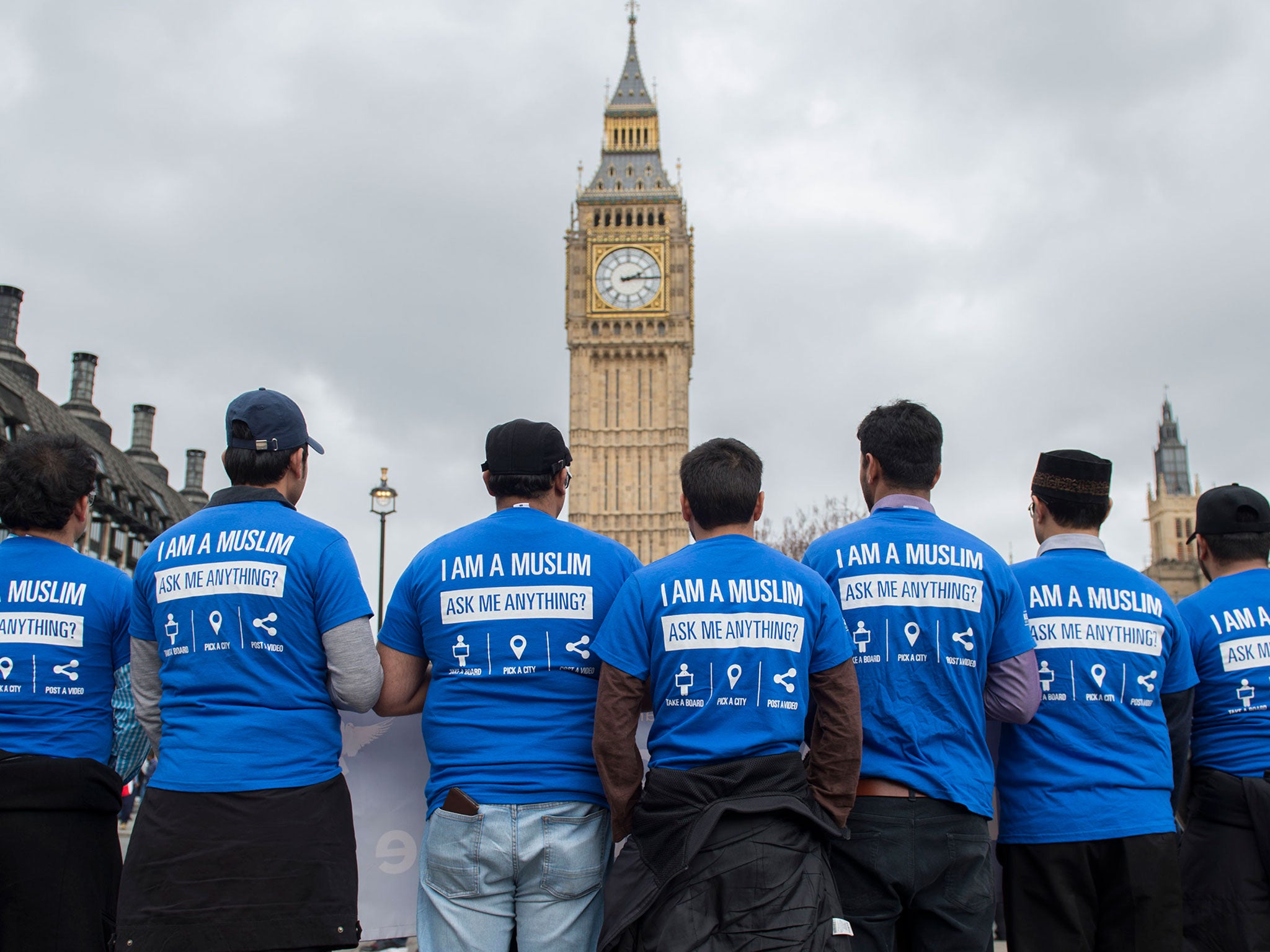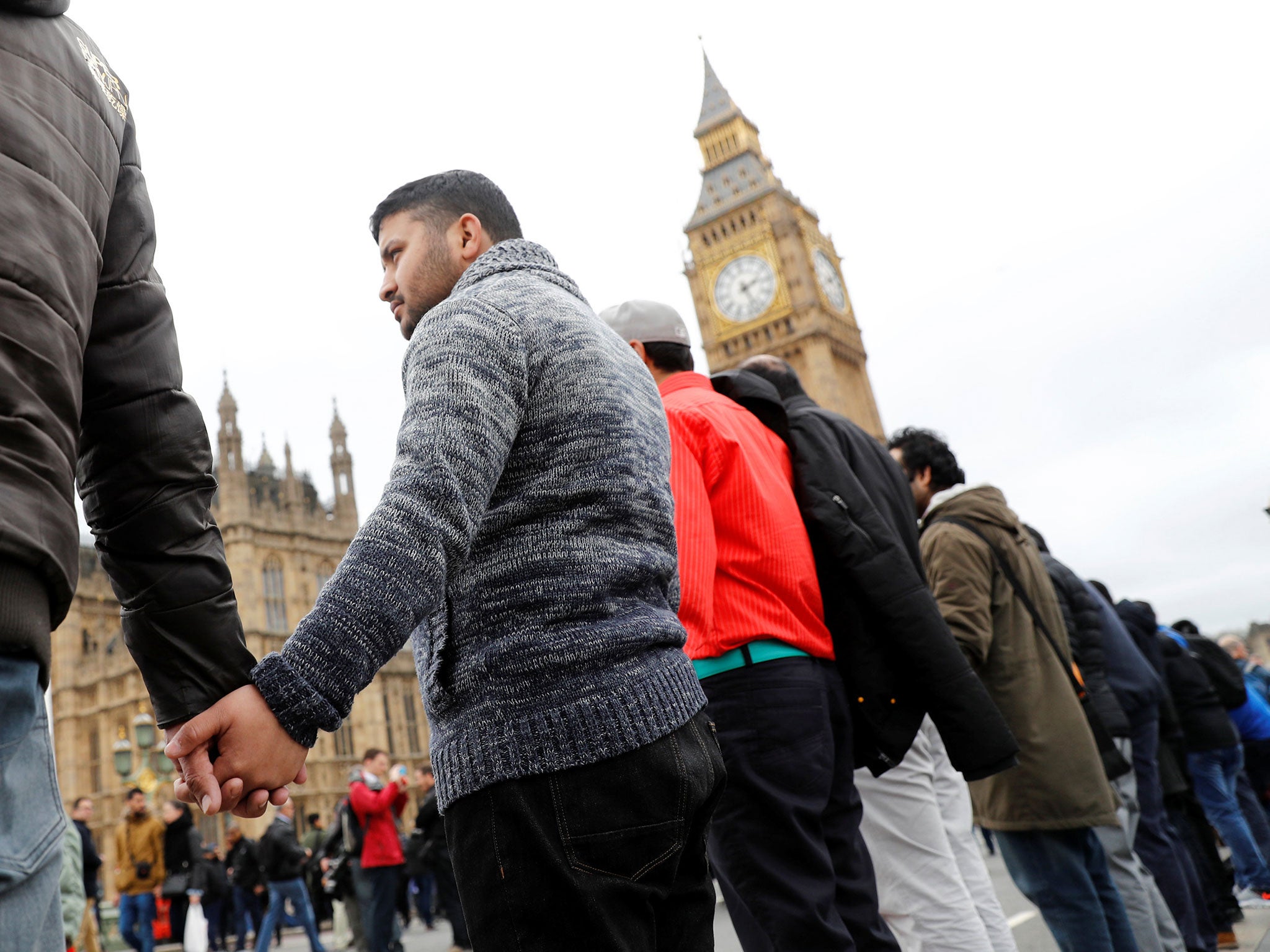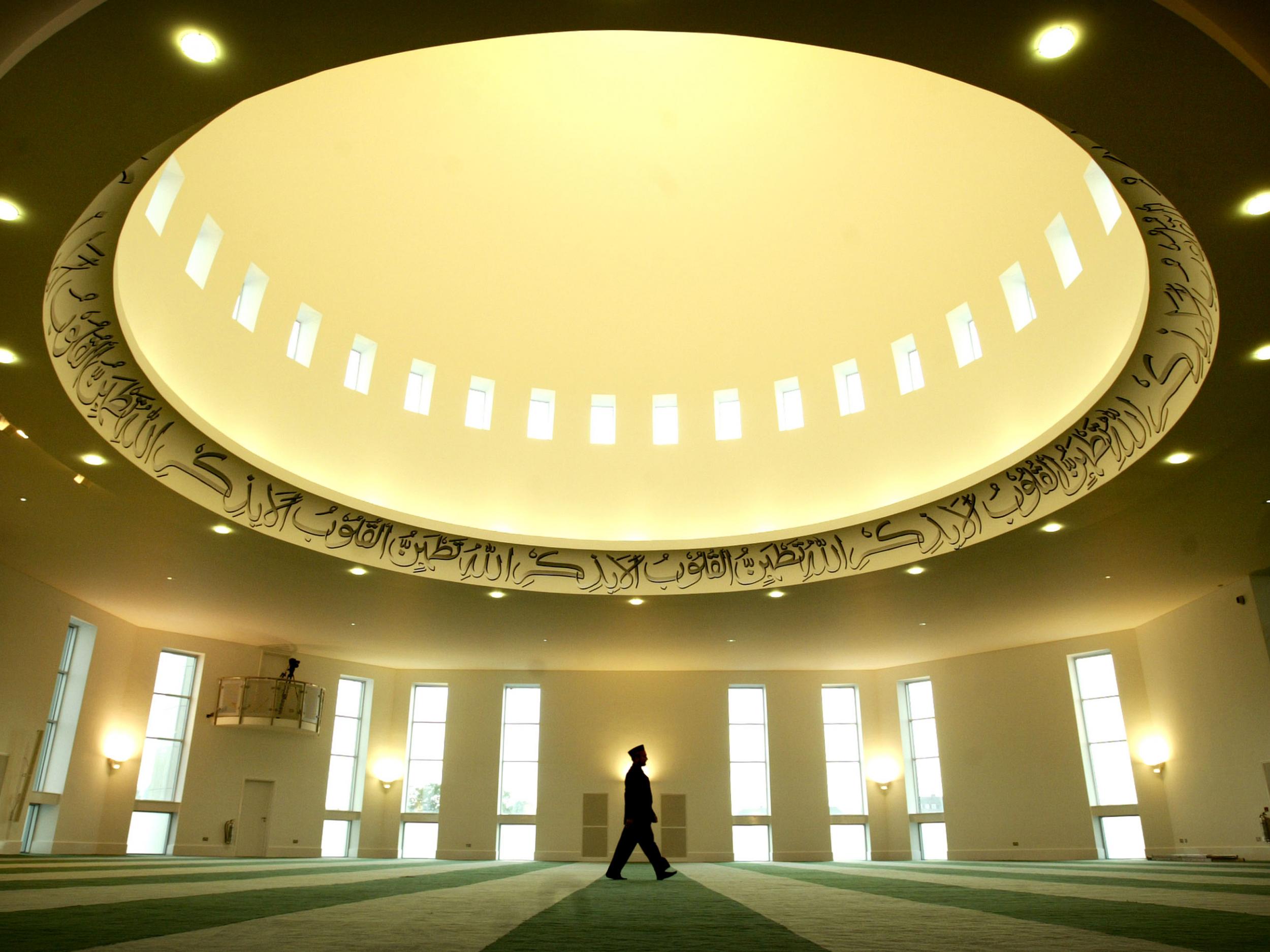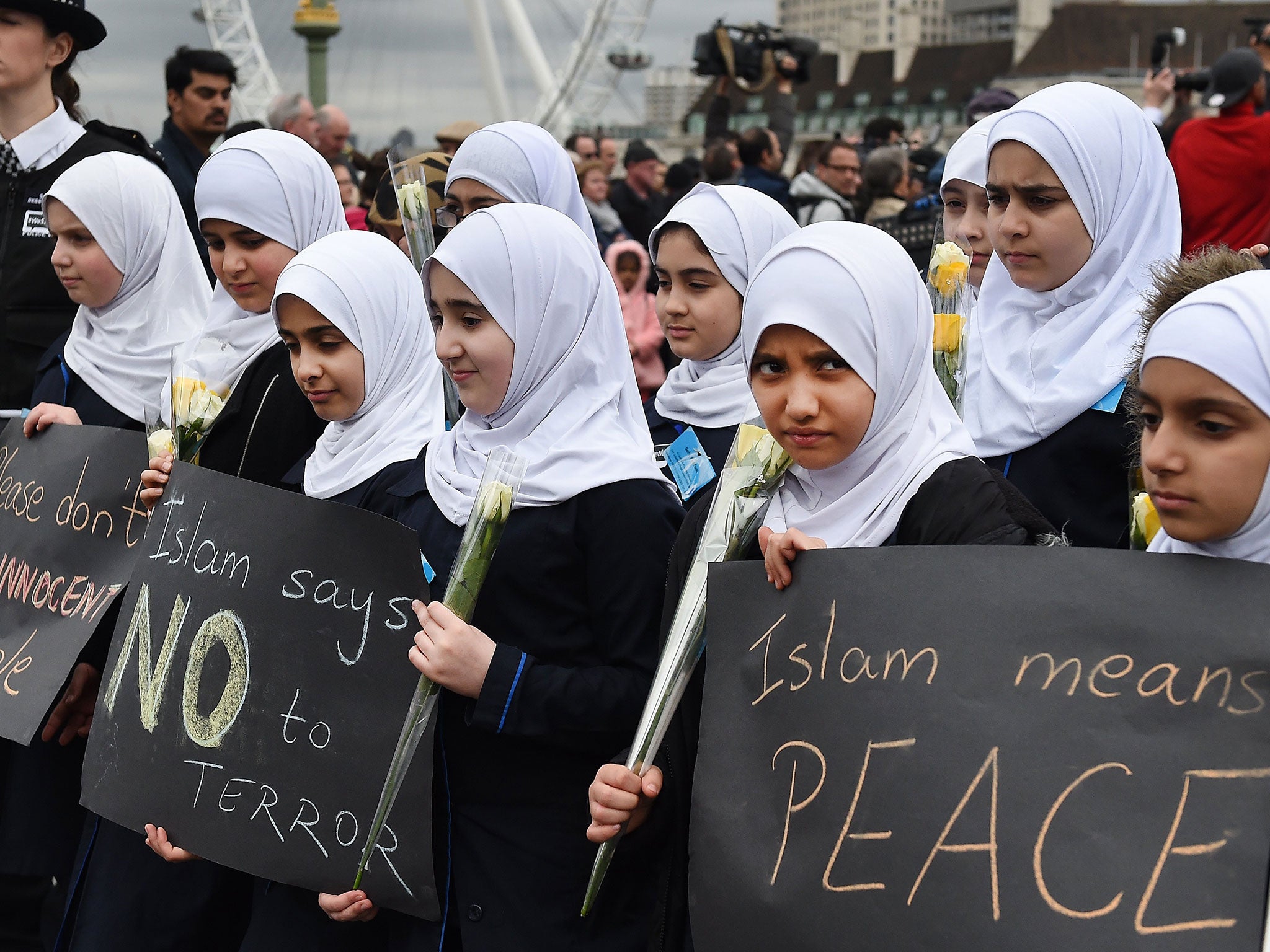‘My caliphate promotes love, not hate’: The 24-year-old imam on a mission to change the way the world sees Islam
Most would agree that the best weapon in the fight against Islamophobia is education. But for Adeel Shah, as he tells Sam Hancock, a change of heart can come from the simplest conversation


The day after the Westminster attack in 2017, Adeel Shah, along with 500 other Ahmadiyya Muslims, went to the bridge where Khalid Masood had killed five people, wearing a blue T-shirt with the slogan: “I’m a Muslim, ask me anything.” Shah and his “brothers and sisters” stood in a line, held hands and encouraged people to ask them questions about Islam – about the religion Masood had claimed to commit this act of terror in the name of. Press from all around the world captured the historic move made by the Ahmadiyya community – and it was met with both understanding and hostility.
“On that day, when we decided it was necessary to go and visit Westminster and teach people the truth about being a Muslim, I was holding a banner which had the motto of our community on it – ‘Love for all, hatred for none’ – and a person came up to me and said: ‘Why are you here?’ It was very clear from the way he asked that he didn’t really want to know why I was there at all, rather he wanted me – for us – to go away,” Shah tells me, when we meet in between prayers in the (currently) quiet Baitul Futuh Mosque in Morden, the largest in Britain.
“But then, what happened was that he was actually open to hearing me out. I spoke about our humanity projects and the work we do. And explained that it isn’t just local: it’s international. And he was so happy, in fact, that he gave me a hug.”
Shah smiles when he tells me this story. In fact, he smiles for the entire time I’m with him – even when our conversation becomes quite bleak. For the next hour, talking in an entirely empty 13,000-man mosque, it becomes clear that the peace and love his caliphate promotes is the common thread between Muslims around the world.
Now a practising imam in Croydon, Shah moved to London from Pakistan when he was just eight months old.
“I’ve lived in Croydon pretty much my whole life – my secondary school was very Catholic,” he says. “I always find it interesting that, because our teachers would ask someone to say either the Hail Mary or the Our Father prayer before every lesson and it was that way for five years – even though it’s been about eight or nine years since I left, I still remember them off by heart. We also went to mass every Wednesday for our assembly, so, yeah, school was very religious for me.”
It strikes me that the reason he tells me this is to show that religion, no matter which one it is, is a universal denominator between people, communities, countries and faiths – that it can bring people together as much, perhaps even more, than it can tear them apart.
“People always ask me what the difference is between being British and being Muslim, and I say to them that being a British Muslim is not to have two separate identities – they’re exactly the same. If you truly live up to proper British values, you are a true Muslim. And if you truly live up to Islamic values, you are a British citizen. They aren’t two identities; they go hand in hand.”
The road to becoming an imam is a long one; after a seven-year degree, which starts at the age of 18, brothers are asked to spend a month in an African country (Shah has just returned from his post in Ghana), “so you understand different cultures, different people, appreciate life and see others appreciating it even when they don’t have much”, spend a month in a subcontinent, then another in a European country, “to gain exposure and experience”. Then, finally, “His Holiness, Mirza Masroor Ahmad [the fifth caliph in Ahmadiyya Muslim history] appoints us, which can be anywhere around the world”. Wherever you are placed, Shah tells me, it is the imam’s responsibility to take care of his new community and its members, and ensure their happiness.

In another life, Shah says, he’d have been a police officer or a firefighter – “I just knew I wanted to do something that helped as many people as possible” – but it was learning philosophy and ethics at college and seeing other imams working tirelessly to serve their communities that made up his mind to complete the divinity MA (where, he jokes, he learnt “all the isms, apart from terrorism”), pledge his allegiance to a caliphate, and commit his life to Islam.
Some of the work Shah and his community have carried out in the past year includes raising over £1m for 10 British charities – counting the RSPCC and the Royal British Legion – mentoring young people, cooking and serving up food for the homeless on a bi-weekly basis, volunteering at blood drives, visiting the elderly in hospital and homes, and volunteering on the Nightwatch service up and down the country.
People always ask me what the difference is between being British and being Muslim, and I say to them that being a British Muslim is not to have two separate identities – they’re exactly the same
“Everything we do is for the good of others – for me personally that is my drive every day: to practice the peace and love that Islam teaches its followers,” he says, still smiling. “Just the other day, someone asked His Holiness what we should do if Brexit does eventually happen – is it better to run away, to avoid the bad economy? And he was told that to be a true Muslim is to show loyalty to your nation, so we must stay here and help our country in whatever way we can.” That is Islam, he tells me, in all its glory.
From the ever-vocal anti-Muslim campaigner Katie Hopkins to the likes of Stephen Yaxley-Thomas (AKA Tommy Robinson), Donald Trump and even our own prime minister, there is much to be said about the Islamophobia that has been allowed to enter the public consciousness, seemingly trickling down from the top.
It doesn’t stop there. Islamophobic incidents rose by 375 per cent in the week after Boris Johnson compared Muslim women to “letterboxes” in August 2018 and just last month, a 14-year-old Muslim schoolgirl was violently attacked on her way home from school – her perpetrators received only a caution.
Munazzah Chou, a Muslim woman from Farnham, says she has noticed an increased in Islamophobia in Britain, particularly against women. “A significant proportion of the British population do not think that Islam is compatible with British values, which is painful for any Muslim to hear. I appreciate that the action of a few people who consider themselves Muslim has no small part to play in this.

“But there has undoubtedly been an increase in anti-Muslim rhetoric and a sense that as a religion Islam ought to be feared. This fear has manifested itself in violence against Muslims and efforts to eradicate its existence. Worryingly, though, so acceptable is the distaste for Islam that barefaced discrimination against Muslims is legislated. In Britain, whilst there is clearly no tolerance for violence, Muslim women, in particular, are fair game as objects of derision.”
However, Shah says: “I think the majority of people in Britain are open-minded and want to understand Islam and what it represents.” He adds: “I would say, though, that the media is playing a really strong role in sometimes presenting negative images and ideals of Islam.”
Education breeds tolerance. Without it, we fail to stand together as a cohesive society and we fail to appreciate diversity and commonalities
For Shah, it’s important that the media does more to represent the good work that Muslims do – not just the acts of terrorists. The media “plays such a big part in ensuring we can build the bridges that we want to. Quicker, rather than slower,” he says.
But it’s not all doom and gloom. “I think this country is really very appreciative of multiculturalism. Racism isn’t the norm here – and if you get pockets of it, it’s because people might be angry at what’s going on in the world,” Shah says. “Admittedly, you do sometimes get people winding their window down and shouting a racist slur when you’re outside a mosque – but, yeah, it isn’t the norm.”
A lack of education is one of the main drivers of Islamophobia. “Education breeds tolerance,” says Shah. “Without it, we fail to stand together as a cohesive society and without it, we fail to appreciate diversity and commonalities. If we come together and have a simple conversation, we will learn to celebrate each other and can work towards establishing a more unified and jubilant society. Come and speak to a Muslim, or visit a mosque, and you will very quickly realise the bridges are already there.”
Shah has seen first-hand what this approach can do. Back on Westminster Bridge, he says changing the mind of someone with doubts felt like “someone had thrown a stone at my heart”.

“The man turned and said to me afterwards: ‘I’ve been living in London for so many years, and this is the first time I’ve spoken to a Muslim.’ I told him how hurt that made me feel, how I couldn’t believe that in the heart of England, the hub of London, this was the first time he was meeting and speaking to a Muslim,” Shah tells me. “And that just goes to show that it isn’t the fault of people who have anger towards Islam – you can understand their anger because they haven’t spoken to a Muslim before. But that made it clear to me that if anyone who had those feelings went out and met a Muslim, their perception would totally change.”
The Ahmadiyya Muslim community run an initiative in Canada called Meet a Muslim Family, where anyone can go online and register their details to be linked up with the closest Muslim family to them – you can then go to that family’s home for lunch or dinner. “The whole thinking behind it is that a lot of people simply need to go and sit with Muslims and realise that the large majority of us laugh, cry and bleed in exactly the same way as they do. As you do,” he says.
It is this understanding from both sides of the table that will ultimately wipe out Islamophobia, Shah believes. “Islam says that there is no compulsion in religion. I can’t enforce Islam on anyone: it is not up to me to do that,” he tells me. “And so the teachings of every angle of Islam – the Quran, our founder, our caliph – promotes world peace and cohesion. That is it.”
But, he tells me, it’s important that people do know one particular Quranic verse, which says killing one man is killing all of humanity and saving one life saves the world. “Ultimately, we have far more in common than that which divides us,” he says.
Talking to Shah, it seems everything he and his community do is geared towards helping people, loving them and teaching them the real Islam. After all, the word Islam comes from the same root as the word peace, he reminds me.
“Our religion is a very peaceful one, but in order to know that people must be willing to see – to understand,” he says. “We know that there is a massive task in front of us, that we have a lot more work to do in order to show people the true message of Islam. We just have to believe that one day those people – that everyone – will realise we are exactly the same as they are.”
A simple Google search of the Ahmadi’s demonstration in the aftermath of the Westminster Bridge attack brings up hundreds of different images, but all with one striking similarity: the solemn look on every Muslim’s face.
“When attacks happen and the name of Islam is used in vain, then we of course have sorrow but also a sense of… not anger, but sadness,” Shah says, gravely, with his head bowed. “Because it is going to the sites of these awful attacks and being there to help people in any way we can that is Islam, that is Muslim – not the act of terror that caused such devastation.”
As the sun shines through the mosque’s windows into the very peaceful prayer room we are sat in, Shah smiles once more. He is sure of his faith, sure of what Muslim people truly represent. And as I take in my surroundings, so am I.
Join our commenting forum
Join thought-provoking conversations, follow other Independent readers and see their replies
Comments